2009 INFINITI QX56 engine
[x] Cancel search: enginePage 3740 of 4171
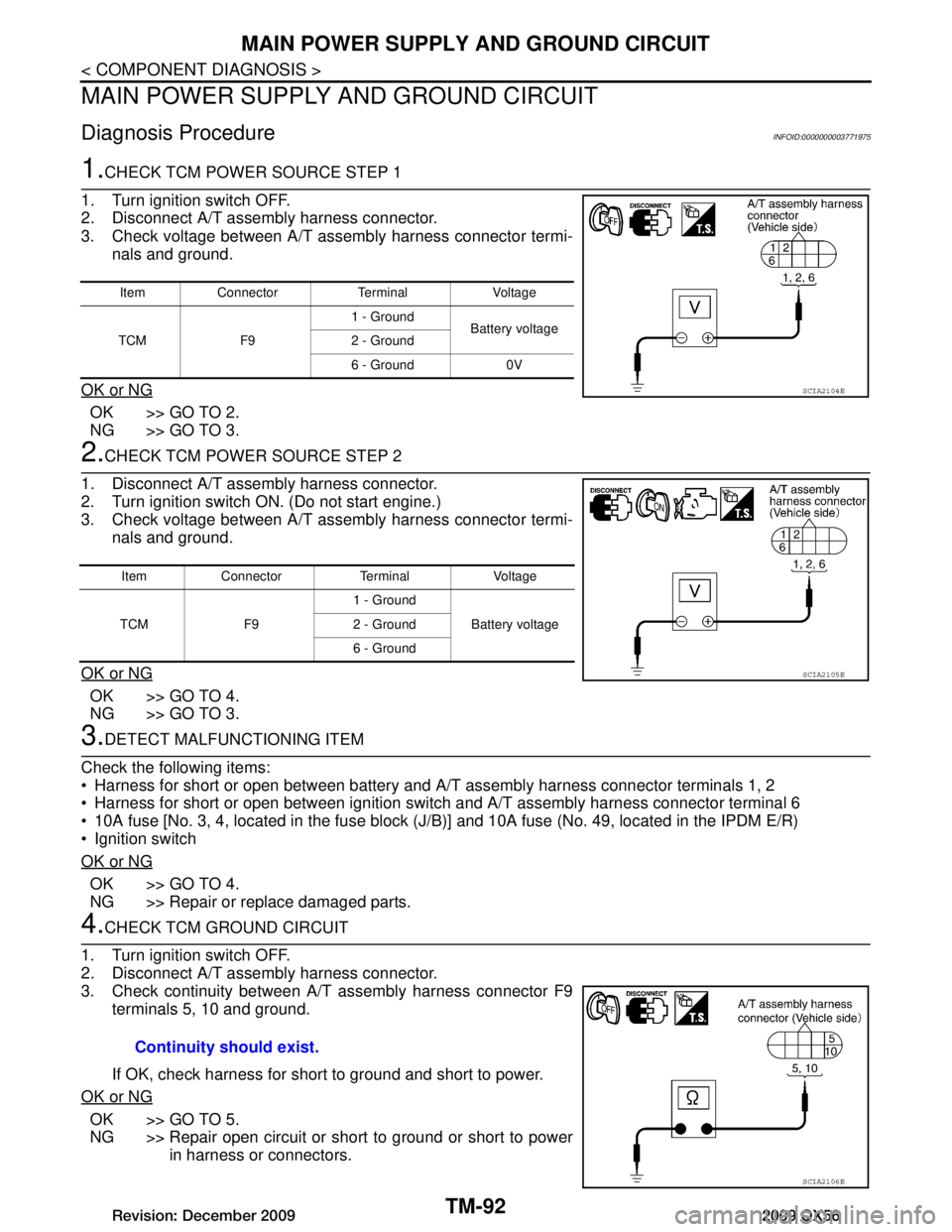
TM-92
< COMPONENT DIAGNOSIS >
MAIN POWER SUPPLY AND GROUND CIRCUIT
MAIN POWER SUPPLY AND GROUND CIRCUIT
Diagnosis ProcedureINFOID:0000000003771975
1.CHECK TCM POWER SOURCE STEP 1
1. Turn ignition switch OFF.
2. Disconnect A/T assembly harness connector.
3. Check voltage between A/T assembly harness connector termi- nals and ground.
OK or NG
OK >> GO TO 2.
NG >> GO TO 3.
2.CHECK TCM POWER SOURCE STEP 2
1. Disconnect A/T assembly harness connector.
2. Turn ignition switch ON. (Do not start engine.)
3. Check voltage between A/T assembly harness connector termi- nals and ground.
OK or NG
OK >> GO TO 4.
NG >> GO TO 3.
3.DETECT MALFUNCTIONING ITEM
Check the following items:
Harness for short or open between battery and A/T assembly harness connector terminals 1, 2
Harness for short or open between ignition switch and A/T assembly harness connector terminal 6
10A fuse [No. 3, 4, located in the fuse block (J /B)] and 10A fuse (No. 49, located in the IPDM E/R)
Ignition switch
OK or NG
OK >> GO TO 4.
NG >> Repair or replace damaged parts.
4.CHECK TCM GROUND CIRCUIT
1. Turn ignition switch OFF.
2. Disconnect A/T assembly harness connector.
3. Check continuity between A/T assembly harness connector F9 terminals 5, 10 and ground.
If OK, check harness for short to ground and short to power.
OK or NG
OK >> GO TO 5.
NG >> Repair open circuit or short to ground or short to power in harness or connectors.
Item Connector Terminal Voltage
TCM F9 1 - Ground
Battery voltage
2 - Ground
6 - Ground 0V
SCIA2104E
Item Connector Terminal Voltage
TCM F9 1 - Ground
Battery voltage
2 - Ground
6 - Ground
SCIA2105E
Continuity should exist.
SCIA2106E
Revision: December 20092009 QX56
Page 3742 of 4171
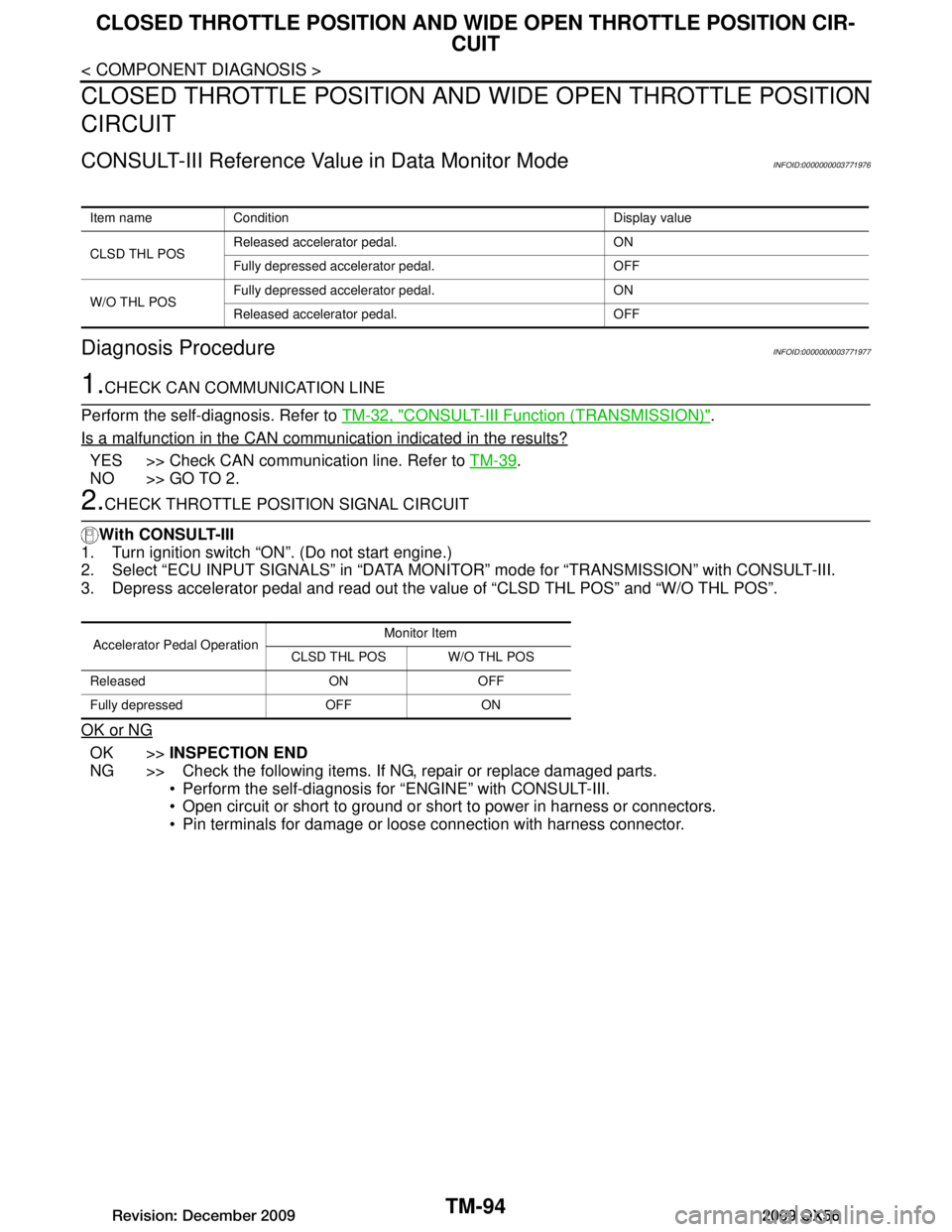
TM-94
< COMPONENT DIAGNOSIS >
CLOSED THROTTLE POSITION AND WIDE OPEN THROTTLE POSITION CIR-
CUIT
CLOSED THROTTLE POSITION AND WIDE OPEN THROTTLE POSITION
CIRCUIT
CONSULT-III Reference Value in Data Monitor ModeINFOID:0000000003771976
Diagnosis ProcedureINFOID:0000000003771977
1.CHECK CAN COMMUNICATION LINE
Perform the self-diagnosis. Refer to TM-32, "CONSULT-III Function (TRANSMISSION)"
.
Is a malfunction in the CAN communication indicated in the results?
YES >> Check CAN communication line. Refer to TM-39.
NO >> GO TO 2.
2.CHECK THROTTLE POSI TION SIGNAL CIRCUIT
With CONSULT-III
1. Turn ignition switch “ON”. (Do not start engine.)
2. Select “ECU INPUT SIGNALS” in “DATA MONI TOR” mode for “TRANSMISSION” with CONSULT-III.
3. Depress accelerator pedal and read out the value of “CLSD THL POS” and “W/O THL POS”.
OK or NG
OK >> INSPECTION END
NG >> Check the following items. If NG, repair or replace damaged parts. Perform the self-diagnosis for “ENGINE” with CONSULT-III.
Open circuit or short to ground or shor t to power in harness or connectors.
Pin terminals for damage or loos e connection with harness connector.
Item name Condition Display value
CLSD THL POSReleased accelerator pedal. ON
Fully depressed accelerator pedal. OFF
W/O THL POS Fully depressed accelerator pedal. ON
Released accelerator pedal. OFF
Accelerator Pedal Operation Monitor Item
CLSD THL POS W/O THL POS
Released ON OFF
Fully depressed OFF ON
Revision: December 20092009 QX56
Page 3743 of 4171
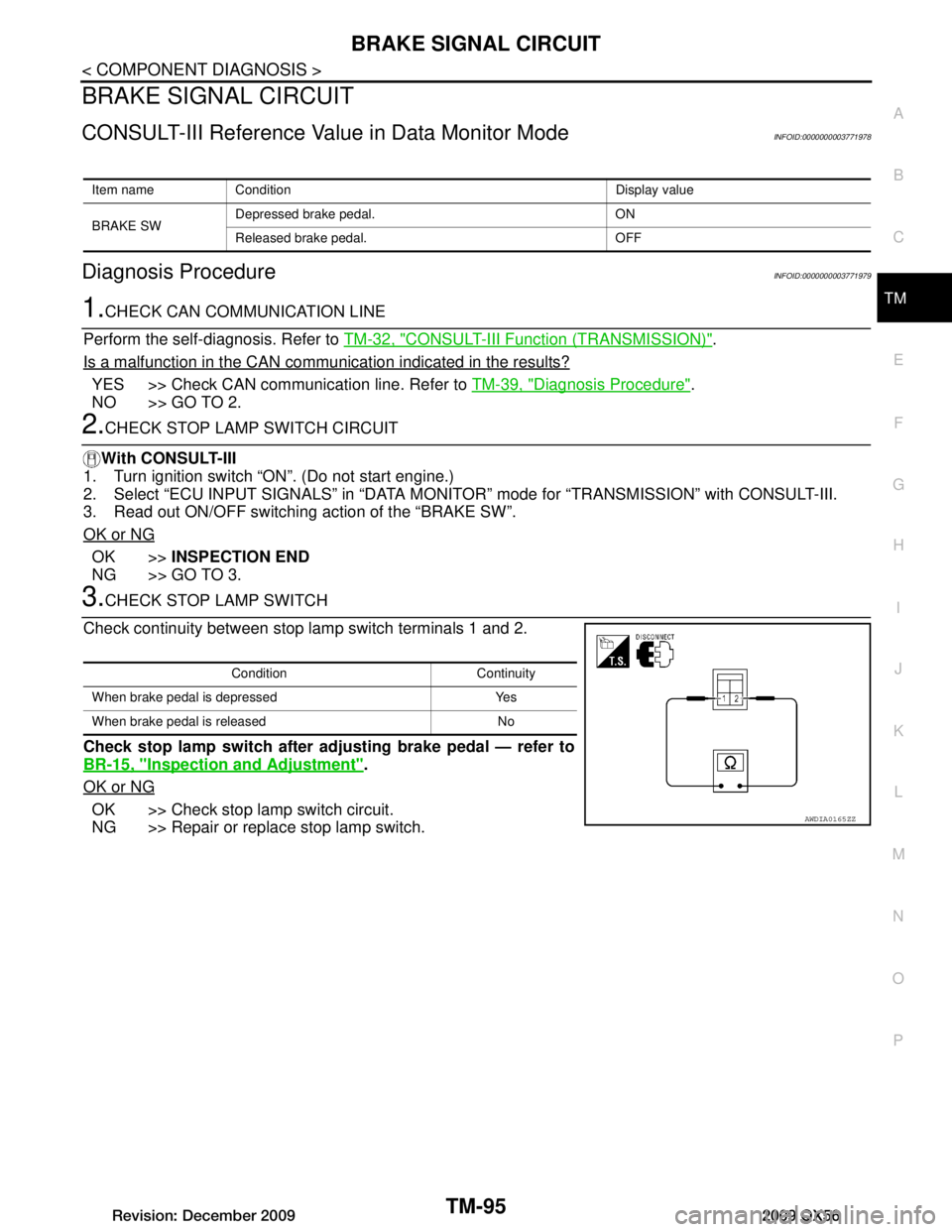
BRAKE SIGNAL CIRCUITTM-95
< COMPONENT DIAGNOSIS >
CEF
G H
I
J
K L
M A
B
TM
N
O P
BRAKE SIGNAL CIRCUIT
CONSULT-III Reference Val ue in Data Monitor ModeINFOID:0000000003771978
Diagnosis ProcedureINFOID:0000000003771979
1.CHECK CAN COMMUNICATION LINE
Perform the self-diagnosis. Refer to TM-32, "CONSULT-III Function (TRANSMISSION)"
.
Is a malfunction in the CAN communication indicated in the results?
YES >> Check CAN communication line. Refer to TM-39, "Diagnosis Procedure".
NO >> GO TO 2.
2.CHECK STOP LAMP SWITCH CIRCUIT
With CONSULT-III
1. Turn ignition switch “ON”. (Do not start engine.)
2. Select “ECU INPUT SIGNALS” in “DATA MONITO R” mode for “TRANSMISSION” with CONSULT-III.
3. Read out ON/OFF switching action of the “BRAKE SW”.
OK or NG
OK >> INSPECTION END
NG >> GO TO 3.
3.CHECK STOP LAMP SWITCH
Check continuity between stop lamp switch terminals 1 and 2.
Check stop lamp switch after adjusting brake pedal — refer to
BR-15, "Inspection and Adjustment"
.
OK or NG
OK >> Check stop lamp switch circuit.
NG >> Repair or replace stop lamp switch.
Item name Condition Display value
BRAKE SW Depressed brake pedal. ON
Released brake pedal. OFF
Condition Continuity
When brake pedal is depressed Yes
When brake pedal is released No
AWDIA0165ZZ
Revision: December 20092009 QX56
Page 3744 of 4171
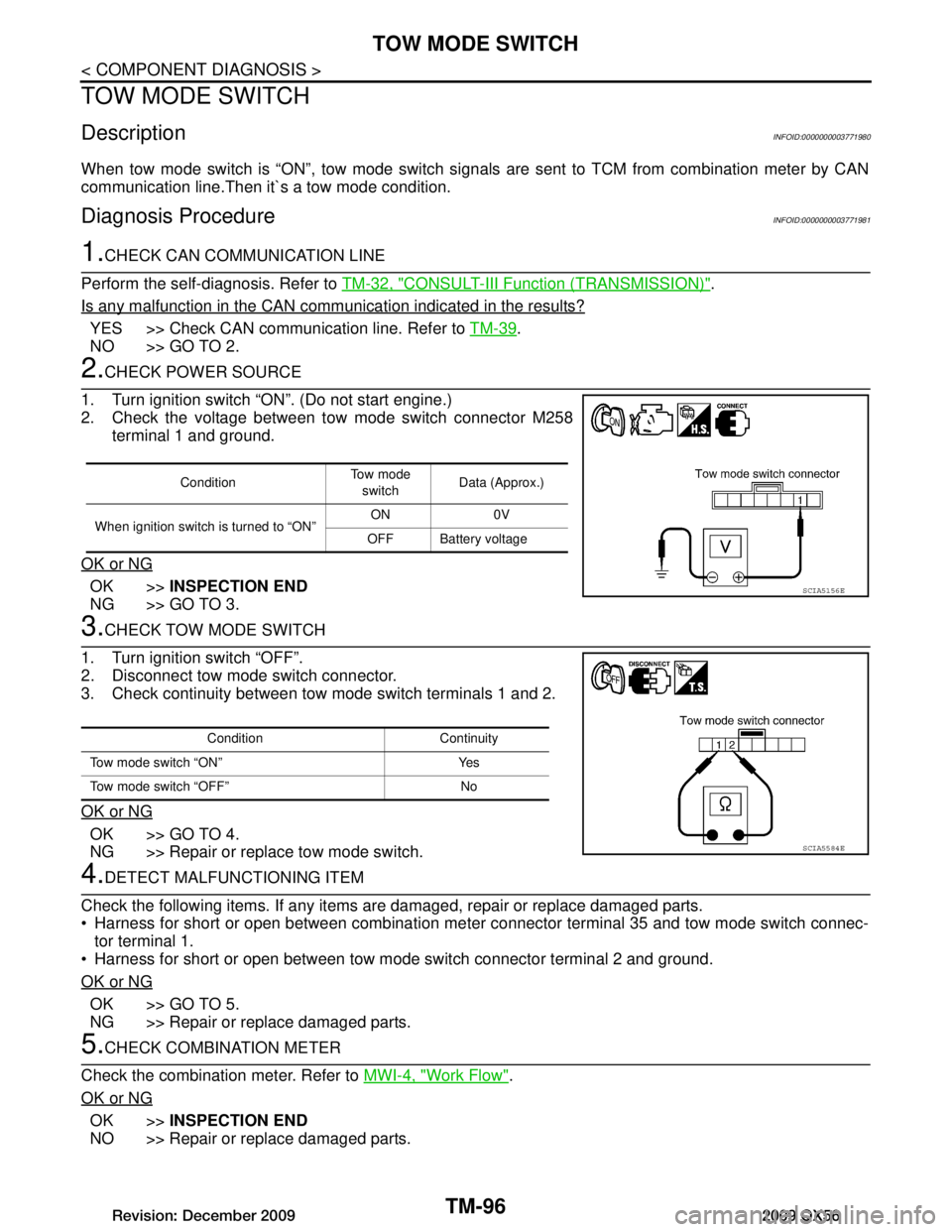
TM-96
< COMPONENT DIAGNOSIS >
TOW MODE SWITCH
TOW MODE SWITCH
DescriptionINFOID:0000000003771980
When tow mode switch is “ON”, tow mode switch signals are sent to TCM from combination meter by CAN
communication line.Then it`s a tow mode condition.
Diagnosis ProcedureINFOID:0000000003771981
1.CHECK CAN COMMUNICATION LINE
Perform the self-diagnosis. Refer to TM-32, "CONSULT-III Function (TRANSMISSION)"
.
Is any malfunction in the CAN communication indicated in the results?
YES >> Check CAN communication line. Refer to TM-39.
NO >> GO TO 2.
2.CHECK POWER SOURCE
1. Turn ignition switch “ON”. (Do not start engine.)
2. Check the voltage between tow mode switch connector M258 terminal 1 and ground.
OK or NG
OK >> INSPECTION END
NG >> GO TO 3.
3.CHECK TOW MODE SWITCH
1. Turn ignition switch “OFF”.
2. Disconnect tow mode switch connector.
3. Check continuity between tow mode switch terminals 1 and 2.
OK or NG
OK >> GO TO 4.
NG >> Repair or replace tow mode switch.
4.DETECT MALFUNCTIONING ITEM
Check the following items. If any items are damaged, repair or replace damaged parts.
Harness for short or open between combination meter connector terminal 35 and tow mode switch connec- tor terminal 1.
Harness for short or open between tow mode switch connector terminal 2 and ground.
OK or NG
OK >> GO TO 5.
NG >> Repair or replace damaged parts.
5.CHECK COMBINATION METER
Check the combination meter. Refer to MWI-4, "Work Flow"
.
OK or NG
OK >> INSPECTION END
NO >> Repair or replace damaged parts.
Condition To w m o d e
switch Data (Approx.)
When ignition switch is turned to “ON” ON 0V
OFF Battery voltage
SCIA5156E
Condition Continuity
Tow mode switch “ON” Yes
Tow mode switch “OFF” No
SCIA5584E
Revision: December 20092009 QX56
Page 3752 of 4171
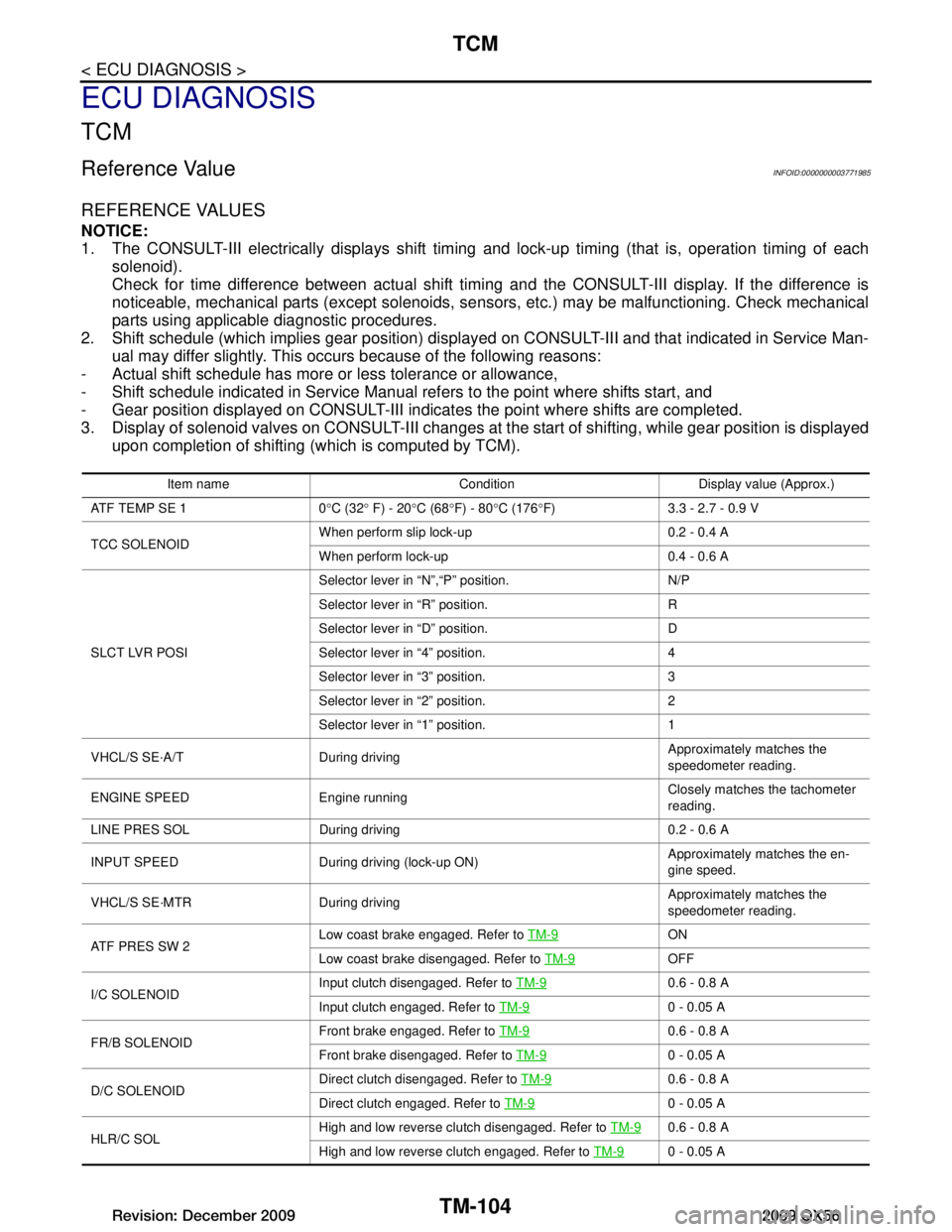
TM-104
< ECU DIAGNOSIS >
TCM
ECU DIAGNOSIS
TCM
Reference ValueINFOID:0000000003771985
REFERENCE VALUES
NOTICE:
1. The CONSULT-III electrically displays shift timing and lock-up timing (that is, operation timing of each
solenoid).
Check for time difference between actual shift timi ng and the CONSULT-III display. If the difference is
noticeable, mechanical parts (except solenoids, sens ors, etc.) may be malfunctioning. Check mechanical
parts using applicable diagnostic procedures.
2. Shift schedule (which implies gear position) display ed on CONSULT-III and that indicated in Service Man-
ual may differ slightly. This occurs because of the following reasons:
- Actual shift schedule has more or less tolerance or allowance,
- Shift schedule indicated in Service Manual refers to the point where shifts start, and
- Gear position displayed on CONSULT-III indicates the point where shifts are completed.
3. Display of solenoid valves on CONSULT-III changes at t he start of shifting, while gear position is displayed
upon completion of shifting (which is computed by TCM).
Item name Condition Display value (Approx.)
AT F T E M P S E 1 0 °C (32 ° F) - 20 °C (68 °F) - 80 °C (176 °F) 3.3 - 2.7 - 0.9 V
TCC SOLENOID When perform slip lock-up 0.2 - 0.4 A
When perform lock-up 0.4 - 0.6 A
SLCT LVR POSI Selector lever in “N”,“P” position. N/P
Selector lever in “R” position. R
Selector lever in “D” position. D
Selector lever in “4” position. 4
Selector lever in “3” position. 3
Selector lever in “2” position. 2
Selector lever in “1” position. 1
VHCL/S SE·A/T During driving Approximately matches the
speedometer reading.
ENGINE SPEED Engine running Closely matches the tachometer
reading.
LINE PRES SOL During driving 0.2 - 0.6 A
INPUT SPEED During driving (lock-up ON) Approximately matches the en-
gine speed.
VHCL/S SE·MTR During driving Approximately matches the
speedometer reading.
ATF PRES SW 2 Low coast brake engaged. Refer to
TM-9
ON
Low coast brake disengaged. Refer to TM-9
OFF
I/C SOLENOID Input clutch disengaged. Refer to
TM-9
0.6 - 0.8 A
Input clutch engaged. Refer to TM-9
0 - 0.05 A
FR/B SOLENOID Front brake engaged. Refer to
TM-9
0.6 - 0.8 A
Front brake disengaged. Refer to TM-9
0 - 0.05 A
D/C SOLENOID Direct clutch disengaged. Refer to
TM-9
0.6 - 0.8 A
Direct clutch engaged. Refer to TM-9
0 - 0.05 A
HLR/C SOL High and low reverse clutch disengaged. Refer to
TM-9
0.6 - 0.8 A
High and low reverse clutch engaged. Refer to TM-9
0 - 0.05 A
Revision: December 20092009 QX56
Page 3764 of 4171

TM-116
< ECU DIAGNOSIS >
TCM
Even when the electronic circuits are normal, under special conditions (for example, when slamming on the
brake with the wheels spinning drastically and stopping t he tire rotation), the transmission can go into fail-safe
mode. If this happens, switch “OFF” the ignition switch for 10 seconds, then switch it “ON” again to return to
the normal shift pattern. Therefore, the customer's v ehicle has returned to normal, so handle according to the
“diagnostics flow” (Refer to TM-5, "Work Flow"
).
FAIL-SAFE FUNCTION
If any malfunction occurs in a sensor or solenoid, th is function controls the A/T to mark driving possible.
Output Speed Sensor
Signals are input from two systems - from output s peed sensor installed on the transmission and from com-
bination meter so normal driving is possible even if ther e is a malfunction in one of the systems. And if output
speed sensor has unusual cases, 5GR is prohibited.
Accelerator Peda l Position Sensor
If there is a malfunction in one of the systems, the accelerator opening angle is controlled by ECM according
to a pre-determined accelerator angle to make driving possible. And if there are malfunctions in tow sys-
tems, the engine speed is fixed by ECM to a pre-determined engine speed to make driving possible.
Throttle Position Sensor
If there is a malfunction in one of the systems, the accelerator opening angle is controlled by ECM according
to a pre-determined accelerator angle to make driving possible. And if there are malfunctions in tow sys-
tems, the accelerator opening angle is controlled by the idle signal sent from the ECM which is based on
input indicating either idle condition or off-idle condition (pre-determined accelerator opening) in order to
make driving possible.
Transmission Range Switch
In the unlikely event that a malfunction signal enters t he TCM, the position indicator is switched “OFF”, the
starter relay is switched “OFF” (starter starting is disabled), the back-up lamp relay switched “OFF” (back-up
lamp is OFF) and the position is fixed to the “D” range to make driving possible.
Starter Relay
The starter relay is switched “OFF”. (Starter starting is disabled.)
Interlock
If there is an interlock judgment malfunction, the trans mission is fixed in 2GR to make driving possible.
NOTE:
When the vehicle is driven fixed in 2GR, a input speed sensor malfunction is displayed, but this is
not a input speed sensor malfunction.
When the interlock is detected at the 3GR or more, it is locked at the 2GR.
1st Engine Braking
When there is an 1st gear engine brake judgment malfunc tion, the low coast brake solenoid is switched
“OFF” to avoid the engine brake operation.
Line Pressure Solenoid
The solenoid is switched “OFF” and the line pressure is se t to the maximum hydraulic pressure to make driv-
ing possible.
Torque Converter Clutch Solenoid
The solenoid is switched “OFF” to release the lock-up.
Low Coast Brake Solenoid
When a (electrical or functional) malfunction occurs, in order to make driving possible, the engine brake is not applied in 1GR and 2GR.
Input Clutch Solenoid
If a (electrical or functional) malfunction occurs with the solenoid either “ON” or “OFF”, the transmission is
held in 4GR to make driving possible.
Direct Clutch Solenoid
If a (electrical or functional) malfunction occurs with the solenoid either “ON” or “OFF”, the transmission is
held in 4GR to make driving possible.
Front Brake Solenoid
If a (electrical or functional) malfunction occurs with the solenoid “ON”, in order to make driving possible, the
A/T is held in 5GR; if the solenoid is OFF, 4GR.
Revision: December 20092009 QX56
Page 3765 of 4171
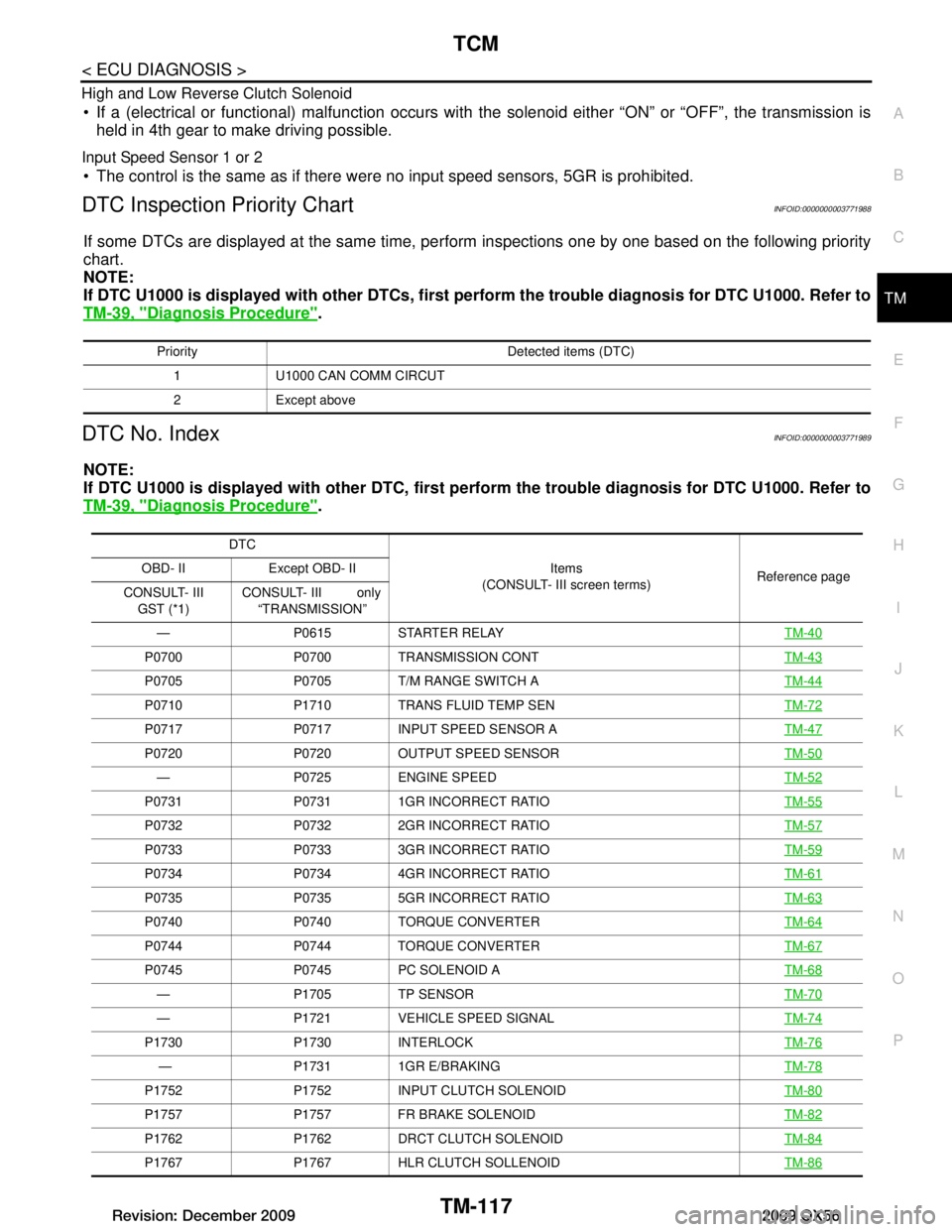
TCM
TM-117
< ECU DIAGNOSIS >
C EF
G H
I
J
K L
M A
B
TM
N
O P
High and Low Revers
e Clutch Solenoid
If a (electrical or functional) malfunction occurs with the solenoid either “ON” or “OFF”, the transmission is
held in 4th gear to make driving possible.
Input Speed Sensor 1 or 2
The control is the same as if there were no input speed sensors, 5GR is prohibited.
DTC Inspection Priority ChartINFOID:0000000003771988
If some DTCs are displayed at the same time, per form inspections one by one based on the following priority
chart.
NOTE:
If DTC U1000 is displayed with other DTCs, first pe rform the trouble diagnosis for DTC U1000. Refer to
TM-39, "Diagnosis Procedure"
.
DTC No. IndexINFOID:0000000003771989
NOTE:
If DTC U1000 is displayed with other DTC, first pe rform the trouble diagnosis for DTC U1000. Refer to
TM-39, "Diagnosis Procedure"
.
Priority Detected items (DTC)
1 U1000 CAN COMM CIRCUT
2 Except above
DTC Items
(CONSULT- III screen terms) Reference page
OBD- II Except OBD- II
CONSULT- III GST (*1) CONSULT- III only
“TRANSMISSION”
— P0615 STARTER RELAY TM-40
P0700 P0700 TRANSMISSION CONT TM-43
P0705 P0705 T/M RANGE SWITCH ATM-44
P0710 P1710 TRANS FLUID TEMP SENTM-72
P0717 P0717 INPUT SPEED SENSOR ATM-47
P0720 P0720 OUTPUT SPEED SENSORTM-50
— P0725 ENGINE SPEEDTM-52
P0731 P0731 1GR INCORRECT RATIO TM-55
P0732 P0732 2GR INCORRECT RATIOTM-57
P0733 P0733 3GR INCORRECT RATIOTM-59
P0734 P0734 4GR INCORRECT RATIOTM-61
P0735 P0735 5GR INCORRECT RATIOTM-63
P0740 P0740 TORQUE CONVERTERTM-64
P0744 P0744 TORQUE CONVERTERTM-67
P0745 P0745 PC SOLENOID ATM-68
— P1705 TP SENSORTM-70
— P1721 VEHICLE SPEED SIGNALTM-74
P1730 P1730 INTERLOCK TM-76
— P1731 1GR E/BRAKINGTM-78
P1752 P1752 INPUT CLUTCH SOLENOID TM-80
P1757 P1757 FR BRAKE SOLENOIDTM-82
P1762 P1762 DRCT CLUTCH SOLENOIDTM-84
P1767 P1767 HLR CLUTCH SOLLENOIDTM-86
Revision: December 20092009 QX56
Page 3766 of 4171
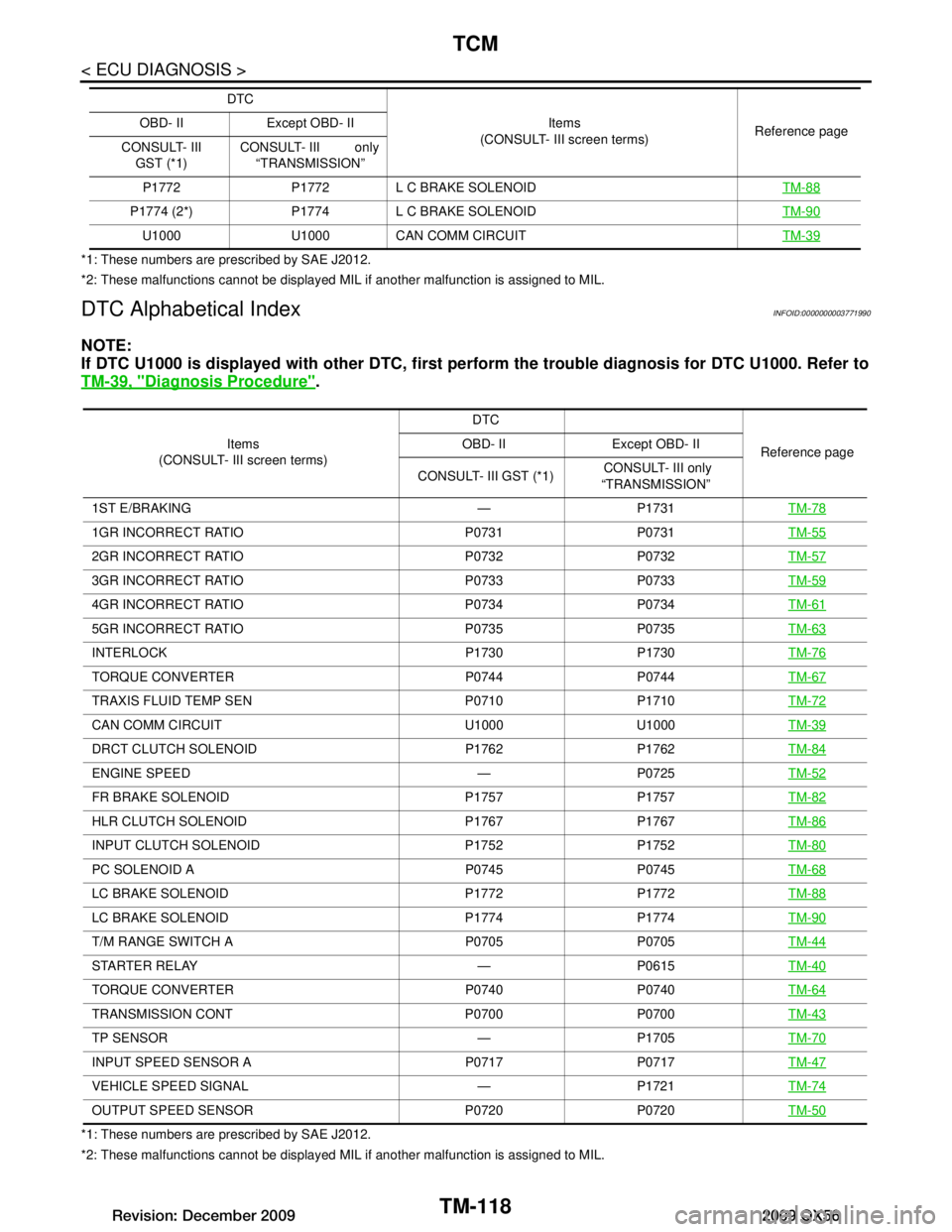
TM-118
< ECU DIAGNOSIS >
TCM
*1: These numbers are prescribed by SAE J2012.
*2: These malfunctions cannot be displayed MIL if another malfunction is assigned to MIL.
DTC Alphabetical IndexINFOID:0000000003771990
NOTE:
If DTC U1000 is displayed with other DTC, first perform the trouble diagnosis for DTC U1000. Refer to
TM-39, "Diagnosis Procedure"
.
*1: These numbers are prescribed by SAE J2012.
*2: These malfunctions cannot be displayed MIL if another malfunction is assigned to MIL. P1772 P1772 L C BRAKE SOLENOID
TM-88
P1774 (2*) P1774 L C BRAKE SOLENOID TM-90
U1000 U1000 CAN COMM CIRCUITTM-39
DTC
Items
(CONSULT- III screen terms) Reference page
OBD- II Except OBD- II
CONSULT- III GST (*1) CONSULT- III only
“TRANSMISSION”
Items
(CONSULT- III screen terms) DTC
Reference page
OBD- II Except OBD- II
CONSULT- III GST (*1) CONSULT- III only
“TRANSMISSION”
1ST E/BRAKING — P1731 TM-78
1GR INCORRECT RATIO P0731 P0731TM-55
2GR INCORRECT RATIO P0732 P0732TM-57
3GR INCORRECT RATIO P0733 P0733TM-59
4GR INCORRECT RATIO P0734 P0734TM-61
5GR INCORRECT RATIO P0735 P0735TM-63
INTERLOCK P1730 P1730TM-76
TORQUE CONVERTER P0744 P0744 TM-67
TRAXIS FLUID TEMP SEN P0710 P1710TM-72
CAN COMM CIRCUIT U1000 U1000TM-39
DRCT CLUTCH SOLENOID P1762 P1762 TM-84
ENGINE SPEED — P0725 TM-52
FR BRAKE SOLENOID P1757 P1757TM-82
HLR CLUTCH SOLENOID P1767 P1767TM-86
INPUT CLUTCH SOLENOID P1752 P1752TM-80
PC SOLENOID A P0745 P0745TM-68
LC BRAKE SOLENOID P1772 P1772TM-88
LC BRAKE SOLENOID P1774 P1774 TM-90
T/M RANGE SWITCH A P0705 P0705TM-44
STARTER RELAY — P0615TM-40
TORQUE CONVERTER P0740 P0740TM-64
TRANSMISSION CONT P0700 P0700TM-43
TP SENSOR — P1705TM-70
INPUT SPEED SENSOR A P0717 P0717TM-47
VEHICLE SPEED SIGNAL — P1721TM-74
OUTPUT SPEED SENSOR P0720 P0720TM-50
Revision: December 20092009 QX56